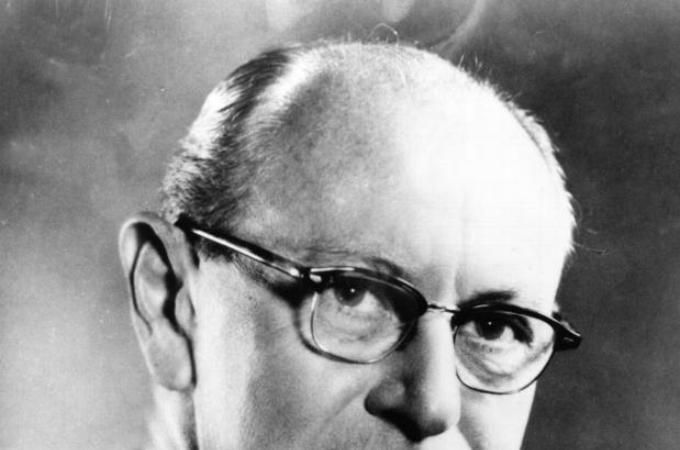Theologian inspires U.S. church 50 years after his death
WASHINGTON (CNS) -- There's little doubt among the church's deep thinkers that renowned theologian Jesuit Father John Courtney Murray continues to shape Catholic social thought and interaction today, 50 years after his death.
Beginning in the 1940s and through his death in 1967, his writings on religious freedom, birth control, church-state relations, Catholic engagement in pluralistic American society, war -- even nuclear war -- and peace have led to a more prominent profile for the U.S. church in public life.
Father Murray also played a role in the Second Vatican Council, having accompanied New York Cardinal Francis J. Spellman to Rome for the council in 1963, 1964 and 1965.
Although he had been forbidden to speak publicly on the issue of religious liberty beginning in World War II because his views contrasted with positions expressed by popes and Vatican officials on the limitations of religious liberty in religiously pluralistic democracies, he helped draft the third and fourth versions of what became the council's 1965 document on religious freedom, "Dignitatis Humanae" ("The Dignity of the Human Person").
While the average Catholic may not know about Father Murray, his essays and theological reflections shaped U.S. Catholic thought in the middle of the 20th century and continue to influence American church life today.
A daylong Georgetown University program Nov. 16 marking Father Murray's Aug. 14, 1967, death examined his legacy within the U.S. Catholic Church. Panels of speakers and a keynote address broadly reviewed what they described as the public theology the Jesuit undertook, examining his writings and relating them to the contemporary world.
In his keynote address, Bishop Robert W. McElroy of San Diego repeated a description of Father Murray that he used in a 2005 article in America magazine, calling him "the most significant Catholic theologian that the church in the United States ever produced."
"His thought was so deeply rooted in the enduring questions of humanity, faith and society, and so precise in its expression that we still find in his work a mine from which we can extract profound insights to address the most compelling questions that we face as a people of faith and a nation in this new millennium," Bishop McElroy said.
It's not just the sheer quantity of Father Murray's work that qualifies him for Bishop McElroy's honor, but also the breadth of issues the priest explored.
And it was his landmark 1960 book "We Hold These Truths," a collection of essays, that helped shape Catholic understanding of the church's role in a pluralistic society.
A biography on the website of Georgetown's Woodstock Theological Library describes, for example, how bishops consulted with Father Murray on numerous legal issues, including birth control and censorship of pornography.
At one point, Father Murray recommended against Catholic opposition to the repeal of a Massachusetts law that had outlawed the sale or use of artificial contraceptives. Writing in Boston College magazine in 1995, Jesuit Father J. Leon Hooper said Father Murray argued at the time that rather than dictate public law, Catholics instead should raise the moral quality of public discourse on the issue.
Father Bryan Hehir, professor of the practice of religion and public life at Harvard University's John F. Kennedy School of Government, told the audience the ongoing debate over the Affordable Care Act offers insight into how Father Murray approached an issue.
It's likely, Father Hehir said, that the theologian would not have opposed the inclusion of contraceptive services in any insurance plan designed for a secular society.
However, Father Hehir then suggested, Father Murray's concern for "the freedom of the church" would have found the Jesuit resisting any legal requirement that church agencies distribute contraceptives.
"On the other hand, having taken a position to protect the freedom of the church, I do not think, to be honest with you, you'd find him on the front steps of the Supreme Court beside the Little Sisters of the Poor," Father Hehir continued. "I think Murray would have thought that while you could contest the case for the freedom of the church, the church ought not to resist the provision of health care for all citizens of this society. Those three steps are the dissections that he used to go through in arguing a case."
Several presentations also addressed Father Murray's concern for the importance of building understanding among people in an increasingly secular society, particularly across faith divides.
Such concerns, said Bishop McElroy, who has extensively studied and written about the work of the Father Murray, suggest that the Jesuit would have been outspoken about the divisiveness that marks American society today. He said Father Murray early in his career wrote about cooperation across faiths long before it became an important goal of Catholic officials.
"His early writings were on this question, defending the notion that there could be working together," Bishop McElroy said. "It may be best for our country in terms of public consensus ... to work together for common goals rather than working out all the foundations for dialogue before we begin to take actions in solidarity."
Afterward, Bishop McElroy told Catholic News Service that Father Murray's insights offer the church and society the opportunity for its members to re-establish bonds with each other and to move beyond political or ideological differences. The bishop called for the solidarity that St. John Paul II envisioned "that ties us together, that there's a sense we're willing to make sacrifices for one another."
"It is the understanding that we are graced to live and are debtors of the society. It's a different stance," Bishop McElroy added. "It's understanding we are all children of one God, we're all together and we're a community graced. We're debtors first and that's how we begin."
- - -
Follow Dennis Sadowski on Twitter: @DennisSadowski.



















